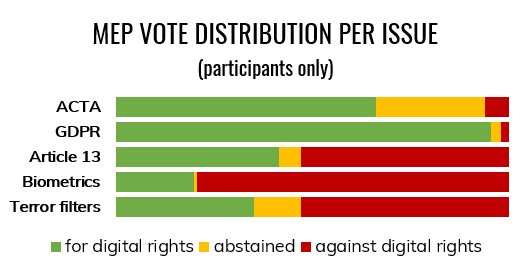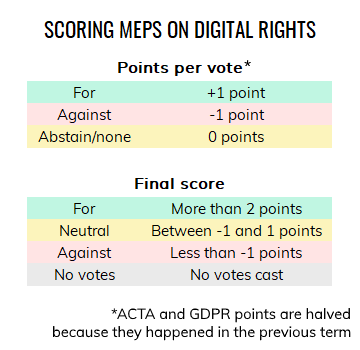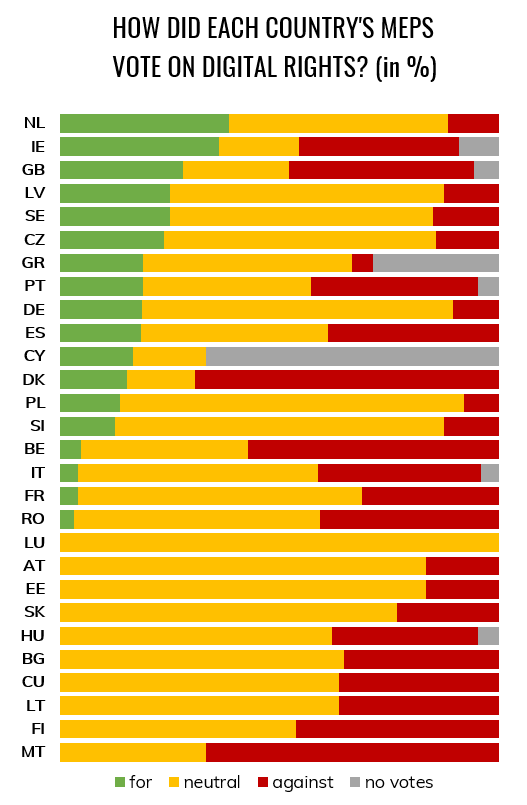With the European elections in two weeks, it's astounding how little the campaigns talk about digital rights. Just two months ago, thousands of people took to the street to protest Article 13. They were backed up by 5 million signatures on an online petition. They stood up for digital rights, only for our representative politicians to keep quiet. If they won't talk about them, we can at least look at how they acted: by analysing their voting history.
Click here to skip to how each MEP voted
What are we looking at?
Five impactful issues have been selected for this analysis. For each of them, the public voting records account for each Member of European Parliament (MEP) vote. Two these issues (ACTA and GDPR) happened in the previous term, but cover over 40% of the current sitting politicians.

The five issues we'll look at are:
(2012) ACTA - The Anti-Counterfeiting Trade Agreement would shift the responsibility of policing copyright from democratic bodies to secret regional negotiations. It included provisions that would broaden the definition of copyright infringement, raise punishment and undermine online freedoms. Due to heavy protests it became a victory for digital rights.
(2014) GDPR - The General Data Protection Legislation is a landmark legislation for the privacy of European residents. While the vote happened at the end of the previous term, it went to effect in 2018 and has had a positive impact for privacy so far.
(March 2019) Article 13 - The new European Copyright Directive was highly controversial due to its inclusion of “content recognition technologies”. It would bring forth even further policing by digital platforms on the content we upload, and not in favour of free speech and fair use. Despite large protests not two months ago, it passed the European Parliament with minor changes in its text, but not its meaning.
(April 2019) Biometric database - It was quiet when the European Parliament voted on creating the world’s third largest biometrics database with a clear majority. With no amendments and no extensive debate it has all the signs of a hastily pushed law. With just two votes, MEPs passed a regulation that went straight against the values laid down in the GDPR. And that is despite warnings from the European Data Protection Supervisor and the EU’s Fundamental Rights Agency (FRA).
(April 2019) Terror filters - In the same week as the biometrics database, there was a vote on whether potentially terrorist content should be aggressively taken down. Once again it passed the European Parliament, ignoring fundamental objections by the FRA. Due to this vote, online service providers have to take down terrorist content within one hour after being notified, without proper safeguards against government power abuse.

Scoring MEPs
A simple scoring system was used to identify the MEPs who consistently vote for or against digital rights. Each vote for digital rights was rewarded with 1 point, whereas a vote against cost 1 point. Scroll to the bottom for a link to the page further detailing my methods and justification.
How did the MEPs do in general?
To better see how MEPs voted, they were divided up per member state. The European Parliament knows its own, pan-European parties, but they're ill-suited for elections on a national level.
The Dutch are in ratio of MEPs voting for digital rights, but a member like Great Britain brings double the votes to the table. It's more interesting to observe that 10 member states have no MEPs consistently voting for digital rights. When looking from the opposite side, only Cyprus and Luxembourg have no consistent negative voters. And for Cyprus that's possibly because 4 out of 6 never bothered to vote at all.

How did each country do?
Despite the clear public message, many MEPs consistently voted against digital rights. A vote in the European elections can be a vote of accountability. If you care about digital rights, vote for someone who does too. Select your country below and see how each of your your national candidates voted.

How did your MEP vote?
Despite the clear public message, many MEPs voted against digital rights. A vote in the European elections can be a vote of accountability. Select your country below and see how your national candidates voted.
Hover over (or tap) a coloured vote to see what they voted.
Voting results of MEPs will appear here.
An explainer for this data analysis is available here.
